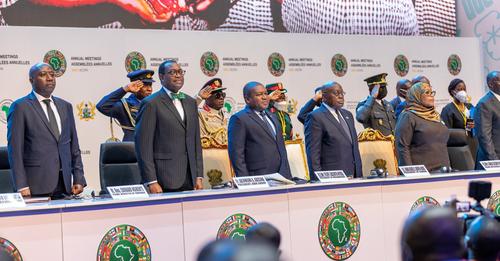Business
AfDB emphasises the importance of an integrated approach to addressing Nigeria’s housing shortfall

The African Development Bank (AfDB) has emphasised the importance of an integrated approach to addressing the African continent’s housing shortfall.
Lamin Barrow, Director-General of the African Development Bank’s Nigeria Country Department, stated this at the Annual Africa International Housing Show (AIHS) under the topic “Beyond Rhetoric to Homes: Making Housing Happen.”
According to Barrow, the event’s topic could not be more appropriate given the urgency of bridging Nigeria’s increasing housing gap.
He stated that the conversations were crucial in order to accelerate measures towards meeting the 11 targets of the United Nations (UN) Sustainable Development Goals (SDG) across the continent.
According to Barrow, the Central Bank of Nigeria (CBN), Nigeria’s housing shortfall expanded from 14 million units in 2010 to 20 million units in 2019.
While the Federal Mortgage Bank of Nigeria (FMBN) assessed a current deficit of 28 million units, the Bank of Industry (BOI) calculated that bridging the housing gap would require N21 trillion.
“The importance of expanding access to adequate housing cannot be overstated.”
“Considering that improved access to decent housing and related basic services for households has a direct impact on population health, education, and productivity.”
“It is fair to say that access to decent housing is linked to life outcomes to a large extent.”
“As a result, improving the enabling environment and developing housing value chains are critical for Africa to achieve its ambitions for inclusive growth and socioeconomic transformation,” he said.
Barrow stated that the AfDB’s initiatives were guided by the goal of promoting human development, which is a primary focus of our High 5 strategic priority of improving the quality of life for Africans.
He added that it was also in keeping with the AfDB’s Urban Development Strategy, which aimed to help African cities turn into engines of economic growth and social development.
“Africa is experiencing unprecedented urbanisation,” he remarked. According to the United Nations, African cities will add 900 million people by 2050.
“This creates a huge need for governments, the private sector, non-governmental organisations, and other key actors to increase the supply of affordable housing and massively invest in the provision of urban infrastructure services.”
“An integrated approach to addressing the housing deficit, particularly for low-income households, is thus required.”
“Home ownership and the contribution of the housing sector to economic growth in Africa remain low, indicating a massive untapped opportunity.”
Increasing business activity in the housing value chains, according to the director-general, will stimulate rapid and inclusive economic growth, “particularly to support post-pandemic economic recovery, address the massive unemployment challenges faced in many African countries, at the scale and opportunities provided by the AfCFTA.”
“Creating a competitive and responsive financial system is also critical for realising Africa’s housing sector’s potential and providing bankable solutions to increase home ownership and create long-term jobs.”
“The limited supply of mortgage financing leaves millions of Africans unable to afford decent housing,” he stated.
According to Barrow, the unmet demand for resources to bridge this gap cannot be met alone by the public or private sectors.
“As a result, there is an urgent need to expand partnerships to unlock finance and foster housing delivery innovations, such as diversifying mortgage securitisation instruments and mechanisms.”
“As your trusted partner, the AfDB will continue its efforts to support Regional Member Countries (RMCs) and private sector initiatives to develop the continent’s housing sector,” he stated.
He stated that the bank was assisting the Nigerian government, Family Homes Funds (FHF), and Primary Mortgage Lenders (PML) through the Family Homes Funds programme, which was worth $60 million.
He stated that the goal was to stimulate the availability of affordable mortgage financing to consumers, as well as to broaden the housing finance system and increase links between main and secondary mortgage markets through a risk-sharing mechanism.
According to Barrow, the partnership will allow FHF and the participating PMLs to underwrite at least 16,000 affordable housing mortgages.
He stated that it would benefit around 79,500 low- and middle-income households, with a preference for female-headed households.
Barrow stated that the AfDB had enhanced access to building materials and basic infrastructure services, hence enhancing access to homes, while citing similar projects undertaken by the bank in Zambia and Kenya.
He mentioned transportation investments, expanding access to water supplies and enhanced sanitation services, and electricity supply to support decent and resilient human settlements.
According to him, attaining the SDG 11 target of adequate housing will necessitate bolder measures from all stakeholders, utilising an ecosystem approach from both the supply and demand sides.And encouraging more private sector investment through Public-Private Partnerships (PPP) to unlock housing delivery innovations and attract institutional investors in housing value chains.
“In addition to showcasing their products and services, this historic event provides a one-of-a-kind platform for stakeholders such as developers, construction companies, financiers, suppliers, and manufacturers.”
“To share experience and insights on driving the agenda to go beyond rhetoric in order to transform the housing sector and increase its contribution to Nigerian and other African economies’ growth.”
“The African Development Bank stands ready to support innovative approaches and partnerships that drive action and assist us in moving beyond rhetoric to provide solutions to improve the quality of life for Africans.”
“Let us work together to create win-win partnerships to provide affordable, adequate, and safe housing for all in Africa,” the director-general said. (NAN)
